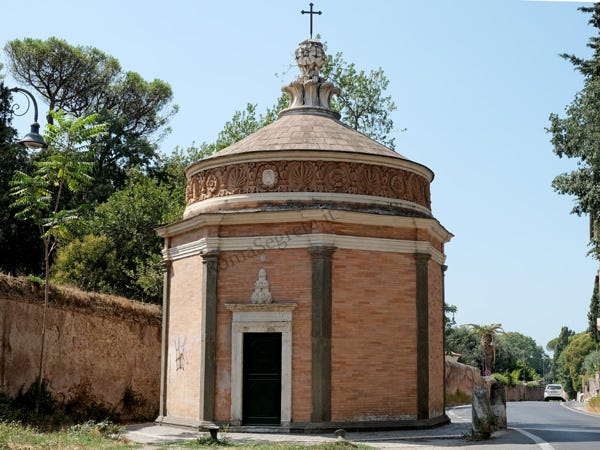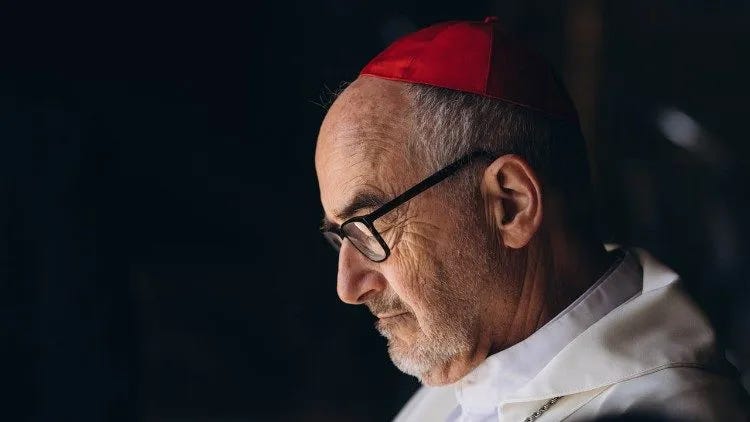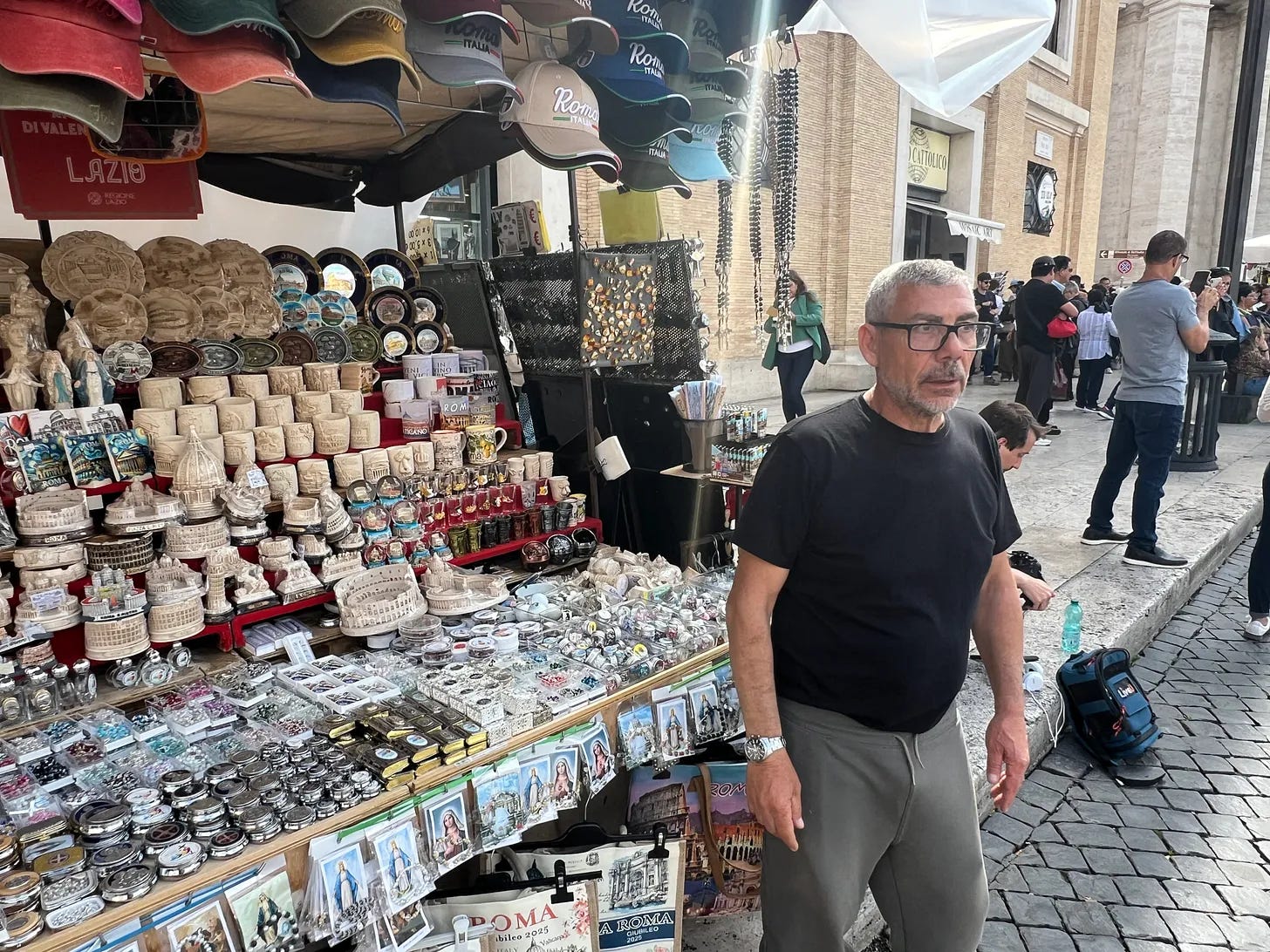Pillar subscribers can listen to this Pillar Post here: The Pillar TL;DR
Hey everybody,
Everything is ready in the Sistine Chapel for the election of a pope.
But before we get to that, there’s a local tradition in the Diocese of Rome that you should know about; a liturgical feast which comes this year just one day before the College of Cardinals will enter the Sistine Chapel and elect the Vicar of Christ on earth.
The feast is officially called St. John at the Latin Gate, because the Latin Gate is where the relevant church is in Rome. But the local people call it San Giovanni in Oleo — “St. John in Oil.”
The story is that St. John the Apostle and Evangelist — the apostle whom Jesus loved — was at some point arrested in Ephesus, brought to Rome, and put on a kind of show trial by the emperor Domitian, a populist autocrat some people saw as a dictator.
Domitian, in an effort to restore the greatness of the city of Rome, was a massive builder, and a decent economic administrator, but he was also a fierce persecutor of Christians — he didn’t like them because their claims of Christ’s divinity were regarded as blasphemy, and he was aiming to restore Roman culture, including the predominance of its pagan religion.
It’s possible that Domitian also disliked Christians because their pesky morality didn’t approve of his rumored affair with his own niece, but no one can really be sure.
Anyway, according to the stories — mentioned by Tertullian and later by St. Jerome — Domitian gave the apostle John a bit of a trial.
Then pronouncing him guilty of crimes against the state, Domitian had John plunged into a large vat of boiling oil.
San Giovanni in Oleo, you’ll recall.
Ordinarily, when flesh hits hot oil, the proteins break down and the moisture turning to steam, cooking the thing fast.
But that didn’t happen to St. John.
He apparently spent several minutes completely submerged in the oil. But according to St. Jerome: “He came out cleaner and healthier than he went in.”
Domitian was apparently so enraged that he made John drink a cup of poison on the spot. When that didn’t work, he came up with the next best possible punishment, and exiled him to Greece, where John had apocalyptic visions, recorded in the book of Revelation.
The tiny little chapel of San Giovanni in Oleo was supposedly built on the spot where God spared St. John death. It’s mostly closed, holding public worship only a few minutes each year at the end of a procession for St. John, as I’m told.
Here’s the point: God is the protector of his Church. And God works in extraordinary, unfathomable ways.
Did St. John really come to Rome to survive being deep fried, so that he could move to Greece and write Sacred Scripture?
I don’t know.
But I do know that God really is acting in the world, to sustain his Church — in sometimes visible ways, and more often in the mysterious movement of the Holy Spirit in ways that are actually much more weird, much more beautiful, and much more profound.
The cardinals will choose a pope. He will be a good pope or a bad pope, we don’t yet know. That will have an impact on all of our lives, and the lives of our parishes and our children. Who the pope is matters.
But it won’t be the pope who sustains the Church. It’s not the pope in whom we should place our faith. It’s the God who can keep men alive in vats of boiling oil, or spare them death by poison. It’s the God who conquered death itself.
It’s the God who has made this Church a sacrament of salvation, in spite of the sins and flaws and errors and strife of 2,000 years.
That’s a profound mystery to me. It’s the one in which I place my faith. God is real, and he loves his Church, in every generation.
Francis published this, in Lumen fidei: “What is communicated in the Church, what is handed down in her living Tradition, is the new light born of an encounter with the true God, a light which touches us at the core of our being and engages our minds, wills and emotions, opening us to relationships lived in communion.”
God, give us that light of faith.
—
By the way, I haven’t been invited to any San Giovanni in Oleo parties, so Ed and I decided to host our own. We’ll be eating fried Roman olives and drinking beer tonight at La Botticella, starting at about 8:30.
If you’re in Rome, come hang out. At 9:15, we’ll toast Our Mother the Church, and the next Roman Pontiff, whoever he is.
The news
There’s a conclave coming up, so we’ve published a lot since Friday. Here’s a breakdown.
First, we’ve been running profiles of possible papal contenders, called “meet the conclave.
Here’s:
Cardinal Fridolin Ambongo
Cardinal Peter Erdö
Cardinal Jean-Marc Aveline
and
Cardinal Dominique Mamberti
Mamberti, by the way, might be an especially interesting figure to read about right now.
Why? Because as the cardinals get close to a conclave without even a clear consensus front-runner, there are some cardinals who say it could be him. In an analysis this morning, Ed broke down the latest on where things seem to stand for the cardinals, and why it’s possible that Mamberti, a career diplomat who now heads the Apostolic Signatura, could be emerging as the consensus pick.
The idea is that Mamberti has the capacity to address the management issues the Church needs to face, and that “he is of no obvious tribe or ideological clique within the college,” which might make him electable.
He also seems eager to teach the Gospel, whose “mission is love itself, which becomes a service to the Church and to all humanity.”
One supporter described Mamberti as “Parolin without the baggage.”
That’s because, as multiple cardinals have told us, there is a keen desire to see a pope elected who is free from financial scandal, or allegations of cover-up or enabling abuse in his diocesan posts.
As one cardinal told The Pillar: “We don’t want to elect a man, and then two weeks later read about his bad habits on your website.”
[As an aside, I took that as a remarkable testament to the power of the public accountability which The Pillar has aimed to create, and probably the best possible endorsement for you to subscribe to our project!]
You can read that Smoke Signal here.
You can read about that here, although I should say that just today, there are indications that the campaign for Prevost didn’t gain the kind of support that some people expected, especially amid reports that one of his champions, Cardinal Oscar Maradiaga, left a meeting in frustration that Prevost wasn’t gaining traction.
Things are very up and down here, as you can see.
Aveline, these cardinals says, “has a public profile that could be attractive for those who wish someone more in line with Francis than Parolin, without the perception of theological inconsistency, as plagues Tagle, or without governance scandals, as with Parolin, Tagle and Prevost.”
Read about that prospect here.
—
Ok, a few more news things to read:
Here’s a Pillar interview with Cardinal Michael Czerny — a self-described “Pillar reader, in a good way,” who aimed to clear up in conversation with us some comments he made last week about “unity” as a priority for the conclave.
And here’s a Pillar interview with Swedish Cardinal Anders Arborelius about evangelization, the priorities of the future pope, and the experience of being a Catholic convert inside the conclave.
AFTER ALL THAT, ARE YOU STILL LOOKING FOR MORE CONCLAVE COVERAGE?
Well, good, because here’s some of my favorite stuff:
— A breakdown from Jason Baguia on the cardinals who have been canonized and beatified.
And now, some news that isn’t (explicitly) conclave related:
(Alright, since that’s about Cardinal Becciu, and thus really about Cardinal Parolin, that one is still conclave related. You got me.)
The law will not likely pass constitutional muster, but for now, it’s a pretty serious issue in the state.
—
My conclave advice
Ok, so by now you’ve probably read, heard, and said just as much about the conclave as you could wish for.
But I have two pieces of advice for all readers, and then a bit of very practical and specific advice for the cardinal electors reading this (and I know there are a few.)
The first piece of advice is this: If you want to know which cardinals actually want to be pope, look to see which ones get fresh haircuts on Tuesday. If you go see the barber before the conclave, we all know that you’re half-hoping to pop up on tv in a white cassock.
The second piece of advice is this: Temper. Your. Expectations.
If you’re old like me, and you grew up in the pontificate of John Paul II, you were trained from a young age to have unrealistic expectations for the Roman Pontiff.
There is not likely a theologian in this conclave with the mind of Benedict XVI. There is not likely an evangelist or global icon of the figure of JPII. We are probably not going to get that kind of pope in this conclave.
In fact, the run of JPII and Benedict was a major historical anomaly. The pope is not always one of the great intellects of an entire century, as was Benedict, and the pope is not always a figure whose very presence shapes world and ecclesial affairs — to say nothing of inspiring hearts — as did John Paul II.
Those guys were unique. Their papacies were not without real and serious shortcomings. But the space they occupied in the Church, and in popular imagination, was practically unparalleled in the history of the papacy.
Whatever the regnal name of the next pope, he will not be a carbon copy of those guys. Probably, that’s good. I’ve said before — and I’ll say again — that the Francis papacy helped cure me of the reflexive ultramontanism I picked up during the reigns of JPII and B16, because the humanity of Francis was so often on display — temper, shortcomings, sufferings, and all.
We saw Francis as a man, not an icon, and we were reminded of the strangeness of the papal office: It is occupied by an ordinary man, of ordinary human capacity, even while it is the most extraordinary call, to be the vicar of Christ on earth.
Ultimately, I don’t know why Christ chose men, not archangels or principalities, to lead his Church. But he did. The next pope will be a man — as was every one before him — and we should not expect better or worse than that.
But neither should we write the pope off in the first moment if he appears to come from an ecclesiastical party other than our own. Neither should we assume he has nothing to say, or nothing we wish to hear, before he even opens his mouth.
Ed and I have reported about various shortcomings of the Francis papacy, and talked on our podcast about the various difficulties we faced during it. But I was moved by Laudato si, and I will never forget the 2020 Urbi et orbi blessing.
And regardless, actually, of our affective sense of the pope, “the Lord gave his Church the gift of apostolic succession,” Francis wrote.
“Through this means, the continuity of the Church’s memory is ensured and certain access can be had to the wellspring from which faith flows.”
Our faith should not rise and fall with the election of the Roman pontiff. God is inviting us more deeply into the Church than that. To know him in the sacraments, in sacred doctrine, in his Word, no matter who is elected a pope.
The next pope will be just a man, possibly with a fresh hair cut. We shouldn’t expect more than that.
—
Now, to cardinal electors, I have a piece of advice for you, and I think it’s important.
It’s practical, not just advice that you should all be praying or something like that.
Yes, you should all be praying, and you can have that advice for free.
In fact, cardinal electors, if you’ve made it this far in life without praying, you’re probably the kind of Pillar reader who threatens to sue us.
But this other thing is practical advice that could make the difference between a good conclave and a bad conclave, or a good pope and a bad one.
Here it is:





